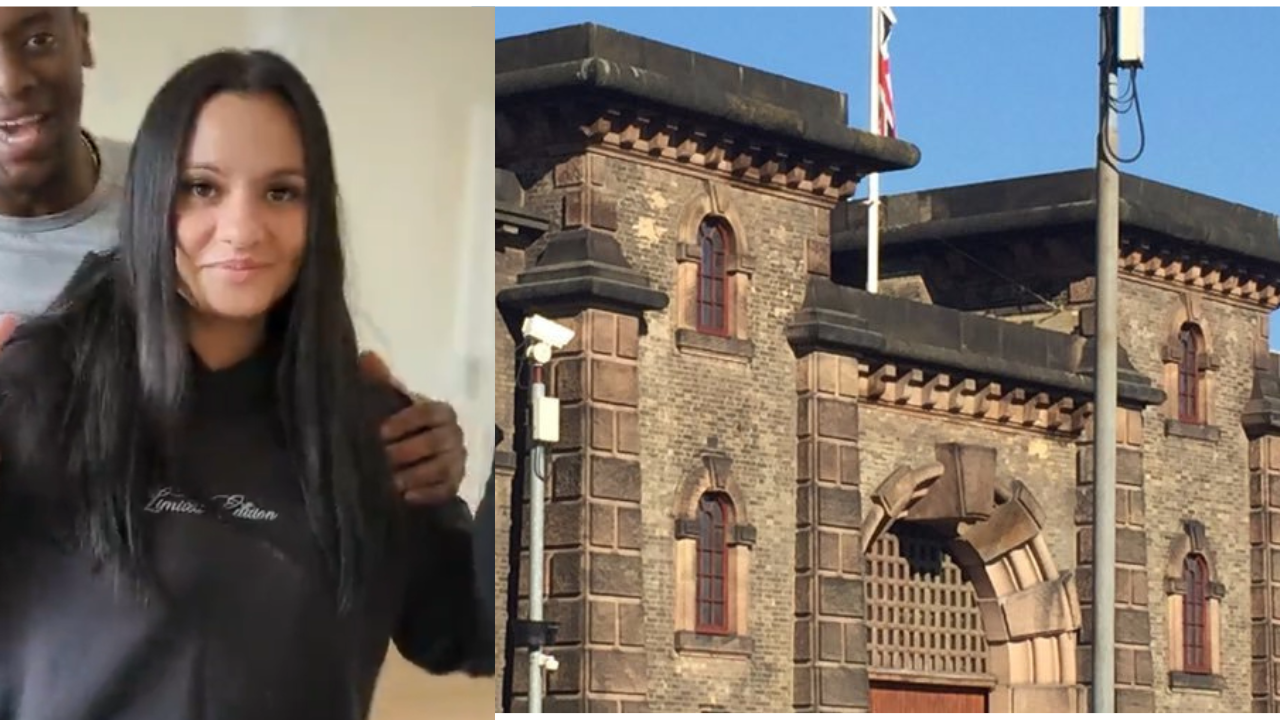Could a lapse in judgment lead to a life forever altered? The case of Linda de Sousa Abreu, a former prison officer, serves as a stark reminder of the far-reaching consequences of actions taken in the shadows.
The story began, as so many do in the digital age, with a video. A video, filmed within the confines of HMP Wandsworth, a men's prison in South London. The footage, which quickly went viral online, depicted an explicit encounter between a female prison officer and an inmate. The officer, identified as Linda de Sousa Abreu, a 30-year-old resident of Fulham, found herself at the center of a scandal that would irrevocably change her life. The illicit act, recorded by another inmate, was shared on social media platforms, spreading like wildfire and drawing the attention of authorities and the public alike.
The incident occurred on June 27th, and within a short span of time, a video began circulating, a clear depiction of a female prison guard engaged in a sexual act with an inmate inside his cell. This was not a clandestine meeting that went unnoticed. The act was captured and shared. The videos rapid spread across the internet immediately sparked investigation and public outrage, which ultimately led to the subsequent charges.
The details of the case paint a picture of both recklessness and betrayal of trust. Linda de Sousa Abreu, a correctional officer at Londons Wandsworth Prison, was not only engaging in an inappropriate relationship with an inmate, but also breaching her duty to maintain order and security. Reports indicate that her encounter with an inmate, identified as career criminal Linton Weirich, was filmed by another incarcerated individual who was, according to some reports, also smoking marijuana at the time. The fact that the incident was recorded and disseminated highlights the disregard for rules and the ease with which technology can be misused within a correctional facility.
The charges against de Sousa Abreu were serious. She was accused of misconduct in a public office, a charge that carries significant penalties. The prosecution's case centered on the abuse of her position as a prison officer. By engaging in sexual activity with an inmate, she was deemed to have wilfully violated the trust placed in her and disregarded her professional obligations. The repercussions would extend far beyond a simple dismissal; her actions had legal ramifications.
Authorities, including the Metropolitan Police, launched an immediate investigation into the matter. The investigation sought to determine the full extent of the misconduct, the identities of all involved, and the implications for prison security. The focus was not just on the single incident captured on video, but also on whether there were any patterns of behavior or any broader security concerns that needed to be addressed within HMP Wandsworth. The prison itself became a focal point, as officials worked to ensure that such breaches of conduct were not indicative of a larger problem within the institution.
- Melinda Clarke Bio Roles In The Oc Csi More Info News
- Danny Woodburn Seinfeld Star Disability Rights Advocate Bio Films
The severity of the situation and the consequences faced by de Sousa Abreu are further underscored by the legal proceedings. In July, she appeared at Isleworth Crown Court, where she pleaded guilty to misconduct in a public office. The plea was not just an admission of guilt, but also a recognition of the gravity of her actions. The court's decision to jail her for 15 months reflects the severity with which the authorities view the misconduct. The sentence served as a clear message: that the misuse of power and the betrayal of public trust will not be tolerated.
The impact of the situation extended beyond the legal ramifications, it touched many levels. The exposure of the video on social media triggered widespread discussions about prison security, the integrity of correctional staff, and the ethical responsibilities of those working within such institutions. Critics of the prison system used the incident as a way to highlight systemic issues, like insufficient training, understaffing, and the vulnerabilities that can arise when these conditions exist. The situation, moreover, offered a reminder that those who work inside a prison must always operate under intense scrutiny.
The case of Linda de Sousa Abreu serves as a cautionary tale. This case has lessons for those who hold positions of power and influence. It is a reminder that actions, no matter how seemingly private, can have devastating consequences. The story of de Sousa Abreus downfall, from prison officer to convicted offender, is a lesson in responsibility. The incident also raised serious questions about the protocols in place at HMP Wandsworth, and highlighted potential failings in the monitoring and supervision of both staff and inmates. The incident underscores the importance of vigilance and adherence to professional conduct.
| Category | Details |
|---|---|
| Full Name | Linda de Sousa Abreu |
| Age | 30 (at the time of the incident) |
| Residence | Fulham, London |
| Profession | Former Prison Officer |
| Location of Incident | HMP Wandsworth, South London |
| Date of Incident | June 27th (of the preceding year) |
| Charges | Misconduct in a Public Office |
| Legal Outcome | Guilty plea, 15-month prison sentence |
| Court | Isleworth Crown Court |
| Inmate Involved | Linton Weirich (career criminal) |
| Source of Information | BBC News (Example - Replace with an authentic source) |
The case also brings into light the potential role of social media in shaping public perception and influencing the justice system. The viral nature of the video meant that details of the case were widely accessible, and the public could form their own opinions, as well as creating a form of instant justice that bypasses formal channels. This could be said to have amplified the consequences for de Sousa Abreu. The sharing of the video may have also accelerated the investigation process, and forced the authorities to deal with it more quickly.
Another aspect of the case that merits consideration is the broader context of prison life. HMP Wandsworth, like many correctional facilities, faces various challenges, including overcrowding, staff shortages, and the constant need to balance security concerns with the welfare of inmates. The incident involving de Sousa Abreu is a stark reminder of the pressures faced by those working within these environments. It is possible that various factors within the prison, such as the work environment, the easy access to prohibited items, and the lack of supervision, could have contributed to the commission of such crimes.
The nature of the offense raises further questions about the responsibilities of prison officers. As custodians of individuals within a correctional system, they are expected to enforce the rules, maintain order, and protect the safety of inmates and colleagues alike. The actions of de Sousa Abreu were a clear betrayal of this trust. Her behavior undermined the integrity of the institution, and raised questions about the level of professionalism and ethics being displayed by staff.
The involvement of an inmate, Linton Weirich, in the incident introduces an additional layer of complexity. With a background as a career criminal, Weirich was already subject to the rules and restrictions of the correctional system. His role in the encounter, and the fact that he was involved in recording the incident, highlight the complex dynamics at play. It underscores the need for constant vigilance on the part of prison staff and the importance of maintaining strict security protocols.
In light of the incident, it is important to reassess the internal controls and oversight mechanisms within HMP Wandsworth. This includes reviewing the training of prison officers, strengthening the procedures for investigating misconduct, and improving the systems for monitoring the behavior of both staff and inmates. It highlights the need for a constant and ongoing commitment to maintaining standards. It also emphasizes the need for prison authorities to address any underlying issues that might contribute to such incidents. A clear message must be conveyed that such activities will not be tolerated, and appropriate measures will be put in place to prevent reoccurrence.
The case also prompts questions about the use of social media in modern society. The viral spread of the video underscores the power of online platforms to distribute content instantly and globally. While social media can be a valuable tool for information sharing, it can also be used to fuel scandals, and to damage reputations. The case involving de Sousa Abreu exemplifies the potential for such platforms to be misused. The quick spread of the video led to widespread public knowledge, and also accelerated the legal process. The incident underscores the need for individuals to think very carefully about the potential consequences of their actions, particularly in the digital realm.
The fact that the video went viral raises questions about consent, privacy, and the right to be free from exploitation. The individuals involved in the video may not have intended for their actions to be broadcast. The wide dissemination of the footage raises questions about the extent to which privacy is protected. The distribution of the video may have caused significant distress to the individuals involved and could be a breach of their rights. The case highlights the need for platforms to have policies in place to prevent the spread of harmful content, and for individuals to think carefully about their digital footprint.
The broader implications of the case extend beyond the legal proceedings. The incident, and the subsequent events, could impact the public's trust in the prison system. It could undermine the efforts to rehabilitate inmates. It could, ultimately, make it harder for prison authorities to maintain order and control within correctional facilities. The case should serve as an impetus for authorities to address the issues.
The sentence that Linda de Sousa Abreu received, 15 months in prison, serves as a stark reminder of the gravity of her actions. While the circumstances of the case are unique, the consequences faced by de Sousa Abreu are not. The incident highlights the serious repercussions that can result from a breach of trust. The case raises awareness of the need for ethical conduct, particularly in positions of authority. The case should prompt reflection on the impact of social media, the responsibilities of prison officers, and the complex dynamics within correctional facilities.
- Natalia Vodianova Born February 28 1982 Early Life Career
- What You Need To Know About Ali C Lopez Gorlock The Destroyer


